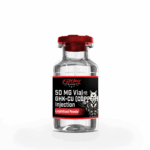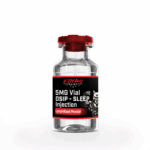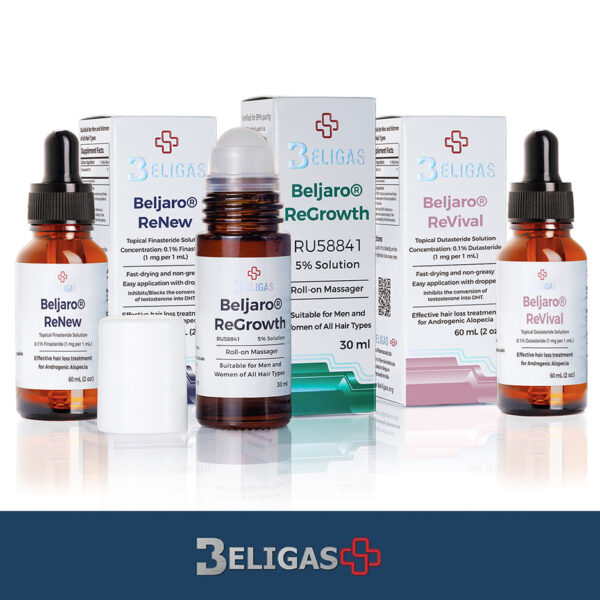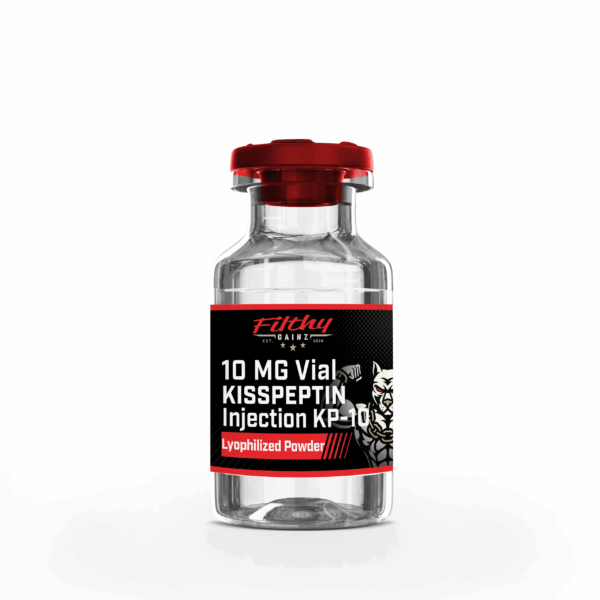

Kisspeptin-10 (KP-10) 10mg Vial
$59.99 Original price was: $59.99.$54.99Current price is: $54.99.
Enhanced Sexual Desire and Arousal
-
Human studies show kisspeptin activates brain areas linked to sexual arousal and attraction (such as the amygdala and hypothalamus).
-
It may increase sexual motivation and emotional connection, particularly in individuals with low libido.
Improved Erectile Function (Indirect)
-
Kisspeptin increases testosterone levels through stimulation of GnRH → LH → testosterone pathway.
-
Healthy testosterone levels support libido, erection quality, and sexual performance.
-
It may also enhance vascular and nitric oxide signaling, though data are limited.
Mood and Emotional Bonding
-
Kisspeptin modulates limbic and cortical brain regions linked to attraction, empathy, and emotional intimacy.
-
This suggests potential benefits for couples with emotional or sexual disconnection.
Fertility Support
-
In both sexes, kisspeptin helps restore normal reproductive hormone signaling.
-
In women, it can induce ovulation and normalize menstrual cycles.
-
In men, it boosts sperm production and testosterone via LH and FSH stimulation.
-
Clinical trials have explored kisspeptin as a safer alternative to hCG in IVF and hypogonadism.
-
-
-
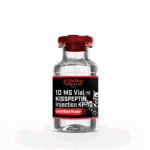
Kisspeptin-10 (KP-10) 10mg Vial
$59.99 Original price was: $59.99.$54.99Current price is: $54.99.
- Description
Description
✅ Sexual / Reproductive Benefits
Here are the sex-/libido-related benefits supported by human/animal studies:
-
In men with hypoactive sexual desire disorder (HSDD), administration of kisspeptin-54 (1 nmol/kg/h IV infusion for 75 minutes) produced significant increases in penile tumescence (erection measure) when viewing erotic stimuli — up to ~56% more than placebo.
-
In women with HSDD, a similar infusion protocol of kisspeptin-54 led to brain-imaging changes in sexual/attraction brain networks.
-
Kisspeptin stimulates the hypothalamic-pituitary-gonadal axis (HPG axis) — it triggers release of gonadotropin-releasing hormone (GnRH), which then boosts LH/FSH, and downstream sex-hormones (testosterone, estrogen) in many contexts.
-
Because of the hormone effect, it’s been studied for fertility, sexual desire, and hormonal deficiency contexts (e.g., low libido, hypogonadism) in men and women.
So in short: the main sexual benefits are increased sexual desire / arousal, improved erectile response in men, and potential improvement in female sexual response/attraction networks.
🎯 Dosage & Administration
Here are reported dosage/administration details from studies and protocols. Note that there is no “standard approved” clinical dosage for libido.
• Human clinical infusion studies
-
One key study: men received an infusion of kisspeptin-54 at 1 nmol/kg/h IV for 75 minutes vs placebo.
-
In women: the same infusion rate (1 nmol/kg/h) over 75 minutes was used.
-
These protocols use IV rather than typical subcutaneous injection and are in research settings.
• More “protocol” sources (non-approved)
-
Some dosing guides list for “libido/sexual enhancement”: ~50 mcg every 2-3 days (subcutaneous) for kisspeptin.
-
Others show for “hypogonadism/testosterone support”: ~100-300 mcg per injection, 3-5 times per week (SC).
-
Some sources propose for sexual enhancement: 100-200 mcg per injection “as needed (1-2 hours before activity)” in SC form.
• Summary table
| Route | Dose example | Frequency | Note |
|---|---|---|---|
| IV infusion (research) | ~1 nmol/kg/h (~many µg/kg) | Single 75-min session | Men & women HSDD study |
| SC injection (protocol) | ~50-200 mcg | Every 2-3 days or “as needed” | Off-label, non-approved use |
| SC injection (hormone support) | ~100-300 mcg | 3-5× per week | For hypogonadism/fertility context |
⚠️ Safety, Limitations & Precautions
-
Kisspeptin is not currently approved for treatment of sexual dysfunction or libido. Studies are limited and mostly in controlled research settings.
-
Long-term safety data are very limited. Some dosing guides caution about receptor desensitization with too frequent dosing.
-
Because it affects the HPG axis, there is potential for altering hormone balance (LH, FSH, testosterone/estrogen). Monitoring would be essential.
-
Side effects reported in studies were minimal, but: injection-site reactions, flushing, hormone over-stimulation or imbalance are possible.
-
Some sources caution about “research use only” status. For example: “Kisspeptin-10 is primarily research compound with limited human clinical data …”
-
Because of the hormone effects, use in pregnancy, breastfeeding, hormone-sensitive cancers, or without medical supervision would carry significant risk.
Related Products
-
Filthy Gainz, LTD, Injections, Peptides, Peptides USA, Peptides, Peptides USA, Top Rated, USA Warehouse
5-Amino-1MQ (5mg Vial)
(1 review) $44.995.00 out of 5 -
Filthy Gainz, LTD, GLP, Injections, Peptides, Peptides USA, Peptides, Peptides USA, USA Warehouse, Weight loss, Weight loss
Bacteriostatic Water 30ml
(1 review)5.00 out of 5$19.99Original price was: $19.99.$14.99Current price is: $14.99. -
Beligas Pharmaceutical, Hair Treatments, Peptides, Peptides USA, Peptides, Peptides USA, USA Warehouse
Beligas Pharmaceuticals’ Revolutionary Hair Care Trio: Beljaro® ReNew, ReVival, and ReGrowth
0 out of 5$189.99Original price was: $189.99.$149.99Current price is: $149.99. -
Beligas Pharmaceutical, Peptides, Peptides USA, Peptides, Peptides USA, USA Warehouse
MT-1 10mg
$44.990 out of 5 -
Beligas Pharmaceutical, Peptides, Peptides USA, USA Warehouse
GHRP-6 5mg
0 out of 5$49.99Original price was: $49.99.$39.99Current price is: $39.99.

